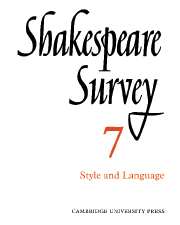Book contents
- Frontmatter
- Fifty Years of the Criticism of Shakespeare’s Style: A Retrospect
- Shakespeare and Elizabethan English
- The Poet and the Player
- Shakespeare’s Orthography in Venus and Adonis and Some Early Quartos
- The New Way with Shakespeare’s Texts: An Introduction for Lay Readers. I. The Foundations
- The Red Bull Company and the Importunate Widow
- Vaulting the Rails
- Shakespeare and the Acting of Edward Alleyn
- The Birmingham Shakespeare Memorial Library
- Shakespeare’s Italy
- International Notes
- Shakespeare Productions in the United Kingdom: 1952
- Acting Shakespeare: Modern Tendencies in Playing and Production
- The Year's Contributions to Shakespearian Study 1 Critical Studies
- 2 Shakespeare’s Life, Times and Stage
- 3 Textual Studies
- Books Received
- Index
- Plate Section
Shakespeare’s Italy
Published online by Cambridge University Press: 28 March 2007
- Frontmatter
- Fifty Years of the Criticism of Shakespeare’s Style: A Retrospect
- Shakespeare and Elizabethan English
- The Poet and the Player
- Shakespeare’s Orthography in Venus and Adonis and Some Early Quartos
- The New Way with Shakespeare’s Texts: An Introduction for Lay Readers. I. The Foundations
- The Red Bull Company and the Importunate Widow
- Vaulting the Rails
- Shakespeare and the Acting of Edward Alleyn
- The Birmingham Shakespeare Memorial Library
- Shakespeare’s Italy
- International Notes
- Shakespeare Productions in the United Kingdom: 1952
- Acting Shakespeare: Modern Tendencies in Playing and Production
- The Year's Contributions to Shakespearian Study 1 Critical Studies
- 2 Shakespeare’s Life, Times and Stage
- 3 Textual Studies
- Books Received
- Index
- Plate Section
Summary
It has been remarked that the audience of an Elizabethan theatre must have been not very different from a modern cinema audience: they cared chiefly for the spectacular and the sensational. The influence of Senecan tragedy is responsible for the way in which the Elizabethan taste for thrillers developed, but assimilation takes place only when there exists an affinity: Seneca supplied the Elizabethan dramatists with a justification for horrors for which there was certainly a spontaneous taste. Plays like The Yorkshire Tragedy and Arden of Feversham, though posterior to The Spanish Tragedy which is clearly indebted to Seneca, cannot be traced to a foreign or classical influence, but are the direct outcome of a native interest in the police-court horrors of the time. Such interest is perhaps nowhere better witnessed than in Nashe’s Unfortunate Traveller, with its sensationalism continually overreaching itself in the display of horrors piled upon horrors, and its iterated showman’s cries: “Prepare your eares and your teares, for neuer tyll thys thrust I anie tragecall matter vpon you.”
- Type
- Chapter
- Information
- Shakespeare Survey , pp. 95 - 106Publisher: Cambridge University PressPrint publication year: 1954
- 2
- Cited by

